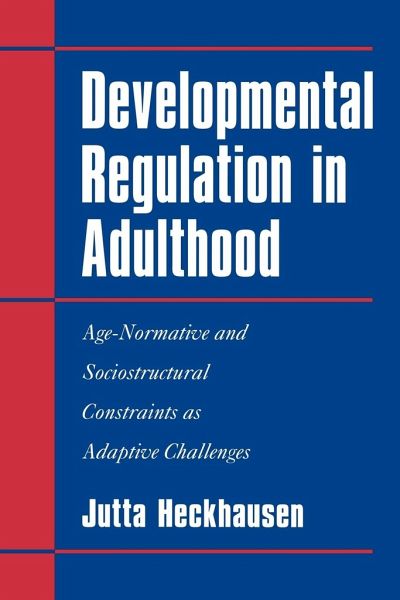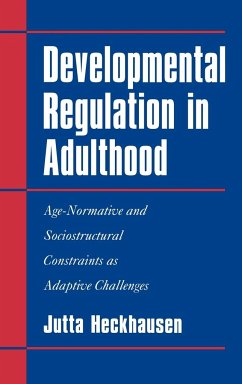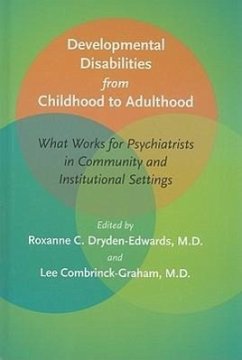
Developmental Regulation in Adulthood
Age-Normative and Sociostructural Constraints as Adaptive Challenges

PAYBACK Punkte
23 °P sammeln!
How individuals influence and organize their life course.Human behavior is very flexible and ontogenetic potential adds to the scope of variability of developmental paths. Therefore, development in the life course needs to be regulated. Developmental regulation by the individual is scaffolded by external constraints. External constraints to development based on biological aging, institutional age-grading, and internalized age norms provide an age-graded agenda for striving for developmental growth and avoiding developmental decline. The life-span theory of control proposes that control of one'...
How individuals influence and organize their life course.
Human behavior is very flexible and ontogenetic potential adds to the scope of variability of developmental paths. Therefore, development in the life course needs to be regulated. Developmental regulation by the individual is scaffolded by external constraints. External constraints to development based on biological aging, institutional age-grading, and internalized age norms provide an age-graded agenda for striving for developmental growth and avoiding developmental decline. The life-span theory of control proposes that control of one's environment is the key to adaptive functioning throughout the life span. The theory identifies the evolutionary roots and the life-span developmental course of man striving to control the environment (primary control) and the self (secondary control). Primary control is directed at producing effects in the external world, while secondary control influences the internal world so as to optimize the motivational resources for primary control. A series of studies illustrate the rich repertoire of the human control system to master developmental challenges in various age periods and developmental ecologies.
Review quote:
"Heckhausen's book is a highly significant event in the publication of life span developmental psychology theory and research. It is a persuasive and illuminating presentation of the ontogenic import of human plasticity and of the significant implications for theory and application of knowledge of adaptive human actions across life."
Richard M. Lerner, Contemporary Psychology
Table of contents:
Acknowledgments; List of tables and figures; Introduction; 1. Selectivity and failure compensation as fundamental requirements of human behavior and development; 2. The life course as a context of action; 3. Primary and secondary control across the life span; 4. A model of developmental regulation across the life span; 5. Developmental goals as organizers of developmental regulation; 6. Developmental regulation in different life-course ecologies; 7. Social comparisons as prototypical strategies in developmental regulation; 8. Conclusions and prospects for future research; References; Indexes.
Human behavior is very flexible and ontogenetic potential adds to the scope of variability of developmental paths. Therefore, development in the life course needs to be regulated. Developmental regulation by the individual is scaffolded by external constraints. External constraints to development based on biological aging, institutional age-grading, and internalized age norms provide an age-graded agenda for striving for developmental growth and avoiding developmental decline. The life-span theory of control proposes that control of one's environment is the key to adaptive functioning throughout the life span. The theory identifies the evolutionary roots and the life-span developmental course of man striving to control the environment (primary control) and the self (secondary control). Primary control is directed at producing effects in the external world, while secondary control influences the internal world so as to optimize the motivational resources for primary control. A series of studies illustrate the rich repertoire of the human control system to master developmental challenges in various age periods and developmental ecologies.
Review quote:
"Heckhausen's book is a highly significant event in the publication of life span developmental psychology theory and research. It is a persuasive and illuminating presentation of the ontogenic import of human plasticity and of the significant implications for theory and application of knowledge of adaptive human actions across life."
Richard M. Lerner, Contemporary Psychology
Table of contents:
Acknowledgments; List of tables and figures; Introduction; 1. Selectivity and failure compensation as fundamental requirements of human behavior and development; 2. The life course as a context of action; 3. Primary and secondary control across the life span; 4. A model of developmental regulation across the life span; 5. Developmental goals as organizers of developmental regulation; 6. Developmental regulation in different life-course ecologies; 7. Social comparisons as prototypical strategies in developmental regulation; 8. Conclusions and prospects for future research; References; Indexes.














